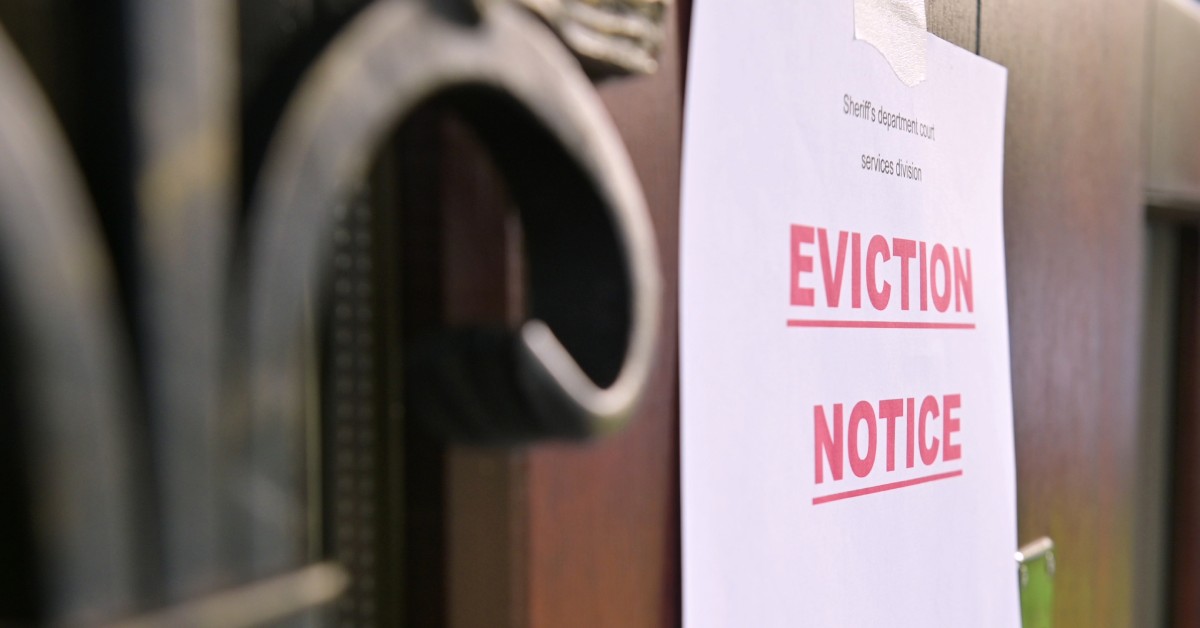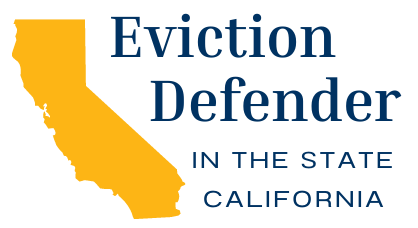
Facing an eviction notice is one of the greatest fears for renters. Many are unfamiliar with what an eviction notice means and how the eviction notice works. Just because your landlord pinned an eviction notice on your door does not mean that you must move out immediately. In this guide, we’ll explain how to delay an eviction if you live in California.
Understanding the Eviction Notice
First, it’s important to understand what kind of eviction notice your landlord has given you. Your landlord cannot simply ask you to leave. California law requires landlords to provide written eviction notices that specify the reason for eviction and give you a specific amount of time to respond.
This notice requirement is your first line of defense and provides valuable time to address the situation. Common types of eviction notices are three-day immediate notices and longer 30/60-day notices.
3-Day Eviction Notices
A three-day notice typically addresses immediate issues like unpaid rent or lease violations that tenants can correct. These notices give you three business days to either pay the rent you owe, fix the problem, or move out. The deadline calculation starts the day after you receive the notice and excludes weekends and court holidays.
30- & 60-Day Eviction Notices
Landlords use thirty-day and sixty-day notices when they want to terminate month-to-month tenancies without cause or at the expiration of lease terms. Sixty-day notices are for tenants who have lived on the property for more than one year. These longer notices count every calendar day, including weekends and holidays.
Read your notice carefully to determine your options and timeline. Some notices offer you the chance to fix the problem by paying rent or addressing a violation. Others require you to move out by a specific date. Understanding which type of notice you received will help you determine the best strategy for your situation.

Immediate Actions To Take
Time is your most valuable asset when facing an eviction. The best way to delay an eviction if you live in California is to take immediate action by either fixing the issue or seeking legal assistance.
Fix the Issue
If you receive a “pay or quit” or “perform or quit” notice, your first step is to determine if you can resolve the issue. For rent-related notices, this means paying the full amount specified by the deadline, as partial payments may not stop eviction proceedings. If you address the problem, document everything—keep receipts, take photos, and notify your landlord in writing (via email, text, or certified mail) of the resolution. Retain all documentation as evidence in case the landlord continues with the eviction despite your compliance.
For non-payment notices, contact your landlord as soon as possible if you can pay the owed amount. Even if the deadline is near, property owners may accept payment up to the last moment, but don’t assume they will accept late payment without written confirmation.
Seek Legal Assistance
Eviction laws can be complex, and professional guidance can improve your chances of delaying or stopping an eviction. While this post provides general information, only a qualified attorney can offer personalized legal advice for your specific case. Many California communities provide free or low-cost legal aid services, including tenant rights groups, pro bono programs, and legal aid organizations that offer support based on income and circumstances.
If you can’t afford an attorney, reach out to your local bar association for referrals to lawyers with payment plans or reduced fees for eviction cases. Some law schools run legal clinics where supervised law students assist under attorney oversight.
Preparing a Response
Even if you cannot immediately fix the problem in your eviction notice, don’t lose hope. You may still stop eviction in California by asserting your rights and preparing a strong response to court proceedings.
Understand Your Rights
California tenants have important rights that can serve as defenses against eviction. Landlords must provide a habitable living space and make necessary repairs; failure to address serious habitability issues could be a valid defense. Tenants also have the right to proper notice before a landlord enters their rental unit, except in emergencies. State law prohibits the violation of entry requirements or attempts at retaliation—such as evictions for requesting repairs or reporting code violations.
Additional protections include rent control and just-cause eviction ordinances in many California cities, which may require landlords to provide specific reasons for eviction and follow strict procedures. State law also protects tenants from discrimination related to race, religion, disability, family status, or other protected characteristics. If you suspect your eviction violates these rights, it could provide a strong legal defense.
Document Everything
To build a strong case, start documenting all interactions with your landlord and the condition of your rental property. Photograph or record plumbing problems, electrical failures, pest infestations, or structural damage, and make sure the proof has a date and time stamp. Whenever possible, have witnesses present during documentation. Keep copies of all written communications, such as emails, texts, letters, and notices, and follow up verbal conversations with written summaries sent to your landlord.
Save records of rent payments, including receipts, money orders, and bank statements, to establish your payment history. In addition, track repair requests and your landlord’s responses, noting unresolved issues that could support a habitability defense or prove a breach of the lease agreement. Document any instances of harassment, discrimination, or retaliation by your landlord, especially if these actions suggest the eviction is retaliatory rather than legitimate.

Taking Action When Court Proceedings Begin
If your landlord files an unlawful detainer lawsuit after the notice period expires, you’ll receive court papers requiring a response within five days. This response, called an “answer,” is your chance to raise defenses and contest the eviction in court. Filing an answer stops the eviction from proceeding automatically, forcing your landlord to prove their case. Even if you believe the landlord has valid grounds, filing an answer buys time and supports the way legal procedures play out.
Your answer should include any defenses, such as habitability issues, improper notices, discrimination, or retaliation, and you can challenge the amount your landlord claims you owe. Courts often allow tenants to present evidence that could lead to more time to move or reduce financial obligations. You might also request a jury trial, which can extend the process by weeks or months, giving you time to secure housing or negotiate a settlement.
Know Your Options and Get Help
Facing eviction is overwhelming, but you have rights and options under California law. Understanding the eviction process and identifying possible defenses can help you protect yourself. While this information is educational and not legal advice, professional legal assistance is crucial.
If you’re in California and need help, contact Eviction Defender today. Our team specializes in providing the guidance you need to navigate this challenging process. We’re here to protect your rights and explore the best options for your situation. Reach out to Eviction Defender now to get the support you deserve.
